- Homepage
- International
- Virtual resources
- Ghana video lecture series
- Histopathology webinars
Histopathology webinars
This series of lectures supports the histopathology membership and fellowship training programmes for the Ghana College of Physicians and Surgeons.
Ghana lecture series 2
Membership

Dr Adrian Bateman
This lecture covers the importance of receiving a good clinical history with histopathology requests, the main steps in assessing biopsies, the assessment of the inflammatory infiltrate, the identification of disease chronicity, the communication of degrees of certainty of histopathological diagnosis, the identification of dysplasia, the main mimics of inflammatory bowel disease, the term focal active colitis’, the composition of a report and the use of scoring systems and proformas.
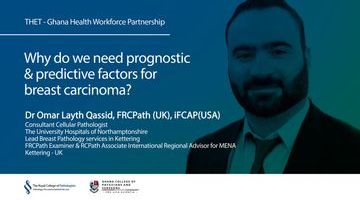
Dr Omar Qassid
During this lecture, prognostic and predictive factors, B-molecular factors, HER2 status, classification of breast cancer, additional prognostic factors, and multigene panels/gene signature are some of the areas discussed and explored.
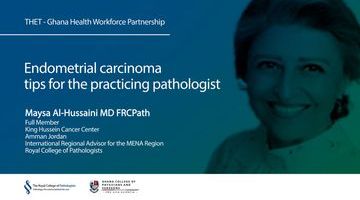
Professor Maysa Al-Hussaini
The incidence of EC is increasing globally. The outcome of EC is improving in better-developed countries compared to countries with limited resources. This lecture will discuss the proper and most updated format for reporting endometrial carcinoma. There will be an emphasis on critical items that should be reported, like the type, grade, and depth of myometrial invasion and lymphovascular invasion, among other factors. It is essential for the pathologist to follow a systematic way of reporting endometrial carcinoma cases by using datasets.
Fellowship
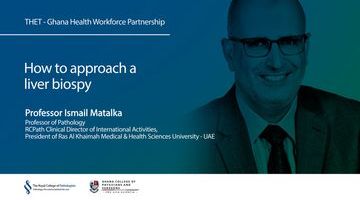
Professor Ismail Matalka
This lecture will cover aspects such as understanding liver history, physiology, and biochemistry, which are essential for adequately evaluating biopsies. Special stains are needed and should be interpreted in the proper context with awareness of their limitations. Establishing the predominant pattern of injury is the first step to considering the possible differential diagnosis is also discussed.
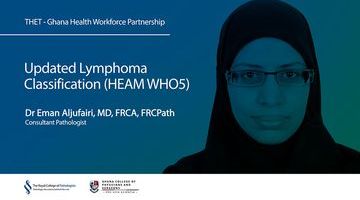
Dr Eman Aljurfairi
Lymphoma classification has evolved tremendously over the last century, from morphology-based classification to an integrated classification based on clinical features, clinical behaviour, morphology, immuno-phenotype and molecular alterations. The 5th edition of WHO classification of hematolymphoid tumours was released last year (2022) with further refinement of lymphoma classification. My lectures will include updates on: change in follicular lymphoma classification, re-defining some large B-cell lymphoma subtypes, molecular updates in peripheral T-cell lymphomas.
This lecture series was created in 2022, but is still relevant for the histopathology pathology membership and fellowship training programmes.
Ghana lecture series 1
Membership

Dr Adrian Bateman
This lecture will provide an overview of the key aspects of resection specimen handling, macroscopic description, and block selection, using colorectal cancer as an example disease. The utility of the Royal College of Pathologists Cancer datasets is emphasised. The importance of linking the macroscopic and microscopic features of cancer resection specimens to key dataset items is highlighted. While this presentation is focused on colorectal cancer, the principles described would be applicable to many specimen types.

Dr Hebah Ali
In this anatomical pathology lecture, we will follow the journey of the sampled biopsy from glass slide to the final pathology report. You will learn about the main diagnostic processes used in biopsy interpretation, become familiar with the artifacts’ challenges and prior treatment effects on biopsy interpretation and know how to produce a clinically useful histopathology report.
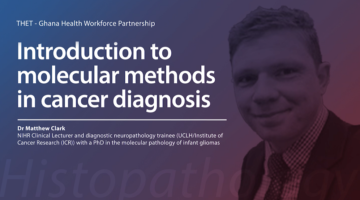
Dr Matthew Clarke
This lecture will describe some of the frequently used molecular techniques across different subspecialties of cellular pathology in relation to cancer diagnosis including immunohistochemistry, methylation profiling, fluorescence in situ hybridisation and different sequencing modalities. It will discuss the advantages of using each of these techniques for the pathologist, and how they can help to further characterise a tumour ensuring a more accurate diagnosis. It will also discuss how these different tests are useful for identifying patients suitable for targeted therapies.
Fellowship

Dr Preethi Gopinath
This lecture on datasets in the histopathologic reporting of cancers aims to give an understanding of what RCPath datasets are, what the elements of the datasets are and outline the application of datasets in routine general histopathological reporting practice. There are datasets available on the RCPath website by tumour site, which provide detailed textual guidance, educational information, guidance for macroscopy and microscopy, reporting proforma templates and information on ancillary and molecular testing where applicable.
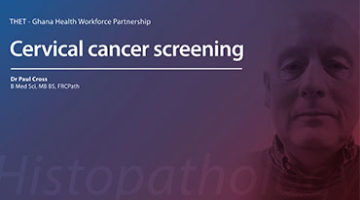
Dr Paul Cross
This lecture will outline the ideas behind population screening and how this can help identify cervical precancer and cancer. It will draw heavily from the WHO Global cervical cancer eradication strategy, and related WHO documentation. It will emphasise the need to offer a screening programme that is appropriate to the setting and resources available, and that several different but related strategies exist. It will emphasise that HPV vaccination is the ideal preventative measure, and how key this will be to the eradication of cervical cancer worldwide.
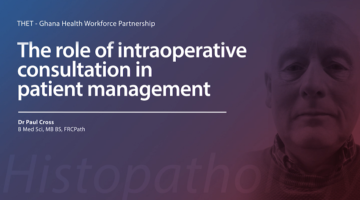
Dr Paul Cross
This lecture outlines the role and use of intraoperative consultation in helping assist with direct patient management. It will describe the use of both frozen sections and cytology in this capacity. It will highlight the advantages and disadvantages of both techniques, and common issues with them. It will also give examples of how intraoperative consultation can be used in patient management.

